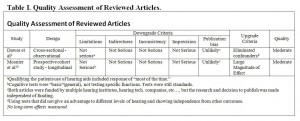Hearing Technology Improves Cognition in Adults with Presbycusis
ABSTRACT
Background: Hearing loss due to the aging process, or presbycusis, is a well-known condition that affects all ages with a prevalence that increases with age. If left untreated, presbycusis has been found to be a risk factor for cognitive decline. Will treating presbycusis improve cognition?
Methods: An exhaustive search of MEDLINE-Ovid, Web of Science, and CINAHL using the following keywords: presbycusis, hearing aid, hearing loss, cochlear implant, cognition, cognitive, intervention. Eligibility criteria included adult studies and studies that use multiple cognitive assessments with significant results and low publication bias. The desired outcome is improved cognition. Since there was a similar systematic review performed in 2011, criteria included studies performed during the years 2012-2015. The resulting studies were then appraised and assessed for quality with GRADE.
Results: The database search resulted in 86 articles that were screened, of which two met eligibility criteria. Poorer hearing was significantly associated with poorer cognition. Those with hearing aids had better cognitive performance. Social isolation was associated with poor hearing and poor cognition. Hearing aids actually increased social isolation. Depression was associated with poor hearing and social isolation. Poor cognition was increased with increased frequency of depression. Hearing aids were not associated with depression. Hearing aids improved cognition in depressed individuals. Cochlear implant improved cognition.
Conclusion: Information gained from the two articles can be applied by promoting early screening and treatment of presbycusis in order to prevent cognitive decline, encouraging the use of cochlear implants in patients that are refractory to conventional hearing aids, and by encouraging persistent use of one’s hearing technology since the improvement to cognition is shown to occur gradually.
Keywords: Presbycusis, hearing loss, hearing aid, cochlear implant, cognition
(Click on image to enlarge.)
REVIEWED STUDIES:
Dawes P, Emsley R, Cruickshanks KJ, et al. Hearing loss and cognition: The role of hearing aids, social isolation and depression. PLoS One. 2015;10(3):e0119616. doi: 10.1371/journal.pone.0119616.
Mosnier I, Bebear J, Marx M, et al. Improvement of cognitive function after cochlear implantation in elderly patients. JAMA Otolaryngol-Head Neck Surg. 2015;141(5):442-450. doi: 10.1001/jamaoto.2015.129.
AUTHOR: Kaipo Lindsey is currently completing his second year in the School of PA Studies at Pacific University, Oregon. He will graduate with an MS degree in August, 2016.

